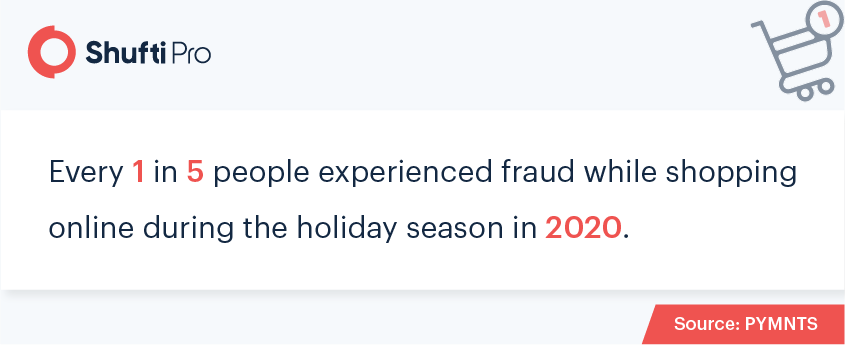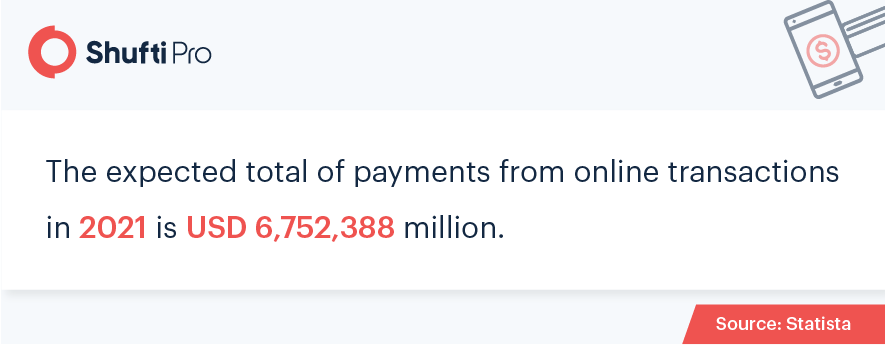Holiday Season – The Time of the Year When Frauds Soar Sky High

Despite being the “most wonderful time of the year”, the holiday season is known to have the highest number of financial crimes arising from data breaches and identity theft. With attractive offers on products that are otherwise too costly for the majority of people, online shopping platforms experience quite a lot of traffic.
During the pandemic last year, these online platforms gained even more prominence as brick-and-mortar supermarkets and malls were closed down to prevent the spread of COVID-19. However, along with the convenience, there is also an increase in the security risks faced by the customers. To be more specific, the fraud rate in 2020’s holiday season was approximately 20.55% according to Shufti’s Global ID Fraud Report.
Which frauds are expected to increase in the holiday season of 2021?
Along with history-making sales this year, frauds are also expected to rise with an increase in the number of customers willing to shop online. Fraudsters are expected to rely on card-not-present and chargeback frauds to fulfill their illicit motives, putting online shoppers at risk.
According to statistics, most of the fraud victims were online shoppers, with 29% of the people reporting multiple instances of fraud, and 8% of them experienced it more than two times. Setting their sights on online shopping platforms, hackers actively make efforts to manipulate customers’ credentials such as credit card information, bank account numbers. This is sufficiently proved by the 400 percent increase in digital account breaches during the holiday season.

Opportunity for Cybercrime During the Holidays
Cybercriminals deploy various techniques for stealing credit card information as their motives go far beyond simply taking over accounts. Capitalizing on the lack of identity verification or any kind of authentication, they make online shopping platforms their playground while staying undetected. Thousands of phishing emails and other scams are reported during the holiday season every year, all with the purpose of getting information from recipients. Phishing emails usually trick customers into disclosing their personal information or passwords. The 2020 Verizon Data Breach Investigations Report showed that compromised passwords contributed to 81 percent of data breaches. This being the reason partly due to repetitive use of the same passwords, and also because users in the digital space always have a certain level of anonymity.
Phishing attacks also download malicious files and redirect users to perform an action upon clicking on a link. The common goal of these cybercriminal entities is to utilize the loopholes of online platforms as well as the lack of users’ ability to recognize suspicious links to access their accounts.
It was found that more than 65 percent of internet users repeat their passwords on different accounts, with the average person repeating it up to 14 times. It is said that protecting one’s identity and credentials online begins with strong, non-repetitive passwords. However, bad actors are now armed with AI technology which enables them to access even the most complex passwords – meaning they have the keys to both the business and the users’ financial information.
Credit Card Fraud
According to a Federal Trade Commission (FTC) report, there have been over 130,000 credit card fraud complaints since mid-2020 with a total loss of $182 million. Credit card fraud never goes out of the news as banks fail to implement sufficient transaction monitoring measures. Misuse of credit card information leads both businesses and individuals into monetary losses every year, particularly during the holiday season. Credit card fraud is expected to further increase in this year’s holiday season, where banks and financial institutions will be in the crosshairs of criminals. Banks must therefore ensure that only legitimate transactions are being made through their system to avoid becoming victims to credit card fraud and regulatory penalties.

Chargeback Fraud
With customers planning to make online purchases and businesses looking to strike favorable deals, fraudsters are lying in wait for their chance. Chargeback fraud is one of the most commonly used techniques where stolen credit card information is used to make transactions. Upon receiving the ordered items, the fraudster claims reversals. eCommerce businesses and online shopping platforms face such frauds every year during the holiday season, consequently losing a considerable amount of money. Online transactions in 2021 have doubled in number as compared to the last year, which means the number of chargeback fraud attempts will also increase.
Charity Fraud
Some of the tactics used by fraudsters are rather unthinkable for online businesses and average online shoppers. In charity frauds, they use emotional words and made-up situations to trick businesses and individuals into making donations. As a result, those willing to help as an act of goodwill become victims, submitting their bank account information which is then used for funding illegal activities.
A spike in such scams was seen in the early months of the COVID pandemic, where online users fell prey to holiday scams that took advantage of their kindness for their illicit motives. Businesses that donated money also ended up with empty accounts during the most wonderful time of the year. These kinds of crime instances highlight the need for checks on disclosure of business information as well as personal details, especially in the holiday season.
KYC for Online Shopping Platforms
Prevention of fraud in the holiday season begins with identity verification and due diligence of all individuals registering at the online platforms. Shufti’s KYC (Know Your Customer) solution includes a customer due diligence process which is implemented to gather information related to the bank accounts and transactions. Whatever the expertise of a scam artist, their schemes are only as good as the platform’s authentication gaps allow.
For instance, perpetrators now employ deep fakes, digital replay attacks, and spoof attacks to manipulate biometric identity verification checks. That being said, AI-driven technology is also being incorporated in verification measures designed to counter crimes like identity theft. Biometric face recognition using deep learning algorithms and embedded technologies like 3D depth perception, liveness detection, and microexpression analysis have enabled digital platforms to detect fraud attempts using deep fake applications.
2 Factor Authentication
Several online shopping platforms lack authentication measures to ensure that only legitimate customers get registered. 2-factor authentication is a solution to place an additional barrier to filter out fraudsters at the time of onboarding or any time the account is accessed.
2-factor authentication is a proven measure for identity theft protection as the one-time verification code is sent to the account holder via SMS or email. Even when the password is compromised, 2-factor authentication stops the bad actors in their tracks. A similar kind of option is an SMS alert whenever the account is accessed, informing the real user of a login attempt.
Key Takeaways
It’s obvious from the trends that criminals avail several fraud opportunities during the holiday season. The time of the year when people expect to strike great deals at much lower prices tends to backfire all because of the flaws and negligence in implementing verification measures. This year will be no different, as the rates of scams are expected to increase again. To protect businesses and individuals from losing money this holiday season, identity verification is a robust solution from Shufti that enables the detection of fraud attempts and verifies identities in less than a second.
Want to learn more about KYC for your online business?

 Explore Now
Explore Now













